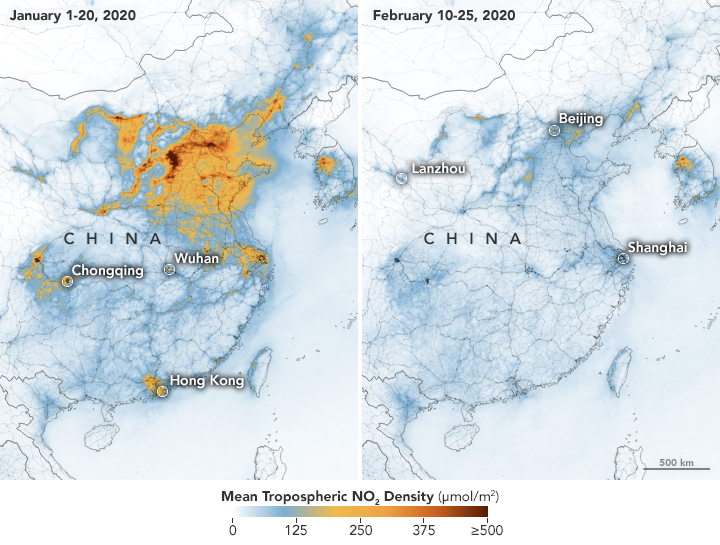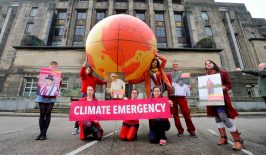The world has come to a screeching halt. Shops, schools and nurseries are closing, events are being cancelled, offices and factories are standing empty. The measures taken to contain the Corona pandemic are having a huge impact on all of our lives. And while this may sound cynical to many given the current situation, the exceptional state we find ourselves in right now could pose a unique opportunity for the fight against climate change.
In China, for example, the corona crisis and the measures taken to combat its spread are thought to have already temporarily reduced the country’s CO2 emissions by a quarter, at least according to a study by Laria Myllyvirta from the Centre for Research on Energy and Clean Air (CREA) at the University of Helsinki.
All over the world, aeroplanes are grounded, cruise ships stuck in the harbour and cars in the garage. According to the International Air Transport Association (IATA), the airline industry is currently experiencing the lowest increase in revenue per passenger kilometre since 2010 due to travel restrictions imposed by the Corona pandemic. As a result, the industry is set to release around 59 million fewer tonnes of greenhouse gasses than it releases on average each year, according to estimates made by Christian Mihatsch of klimareporter.
And it’s interesting to note that this decrease will not only have an impact in 2020, but also in the following years too. The Corsia mechanism, which was adopted in 2016, states that the industry’s growth should be offset compared with a baseline of average total emissions for 2019 and 2020. All CO2 emissions created over this benchmark after 2020 will have to be compensated with carbon offsets – payments made to climate protection projects – according to the decision of the International Civil Aviation Organization (ICAO). With thousands of flights grounded due to the corona virus, this year’s figures the will be significantly lower than initially expected, meaning that the demand for carbon offsets will increase and airlines will be forced to do more to offset emissions.
According to Reimund Schwarze, climate economist at the Helmholtz Institute for Environmental Research, this guideline value cannot be changed. Regulations concerning possible loopholes, such as the crediting of carbon offsets or double crediting, are not yet set in stone, however, and could therefore still be relaxed by the ICAO, especially in view of the current crisis.
Is all this extra streaming and video conferencing bad for the environment?
As a result of the measures taken worldwide to contain the Covid-19 pandemic, much of our work and social life has been shifting to the internet. Work meetings are being held via video conferencing. Readings, concerts and exercise classes, and last but not least, video entertainment from platforms like Netflix or YouTube are being streamed online. Vodafone, the world’s second largest mobile operator, that operates in more than 65 countries, has already seen “data traffic increase by 50% in some markets.” So does all this extra streaming and Skyping mean we’re using more power, releasing more CO2 and increasing our digital carbon footprint?
“If we look at the the data centres, we will definitely see an increase in consumption and in the emissions. But the effect on the overall economy will be small,” Clemens Rohde, energy expert at the Fraunhofer Institute for Systems and Innovation Research, explained to RESET. In private households, too, online services only makeup around 10% of total electricity consumption. “So even if volume of data does increase, private households will hardly notice this in their energy bills.”
According to Rohde, the biggest driver of bandwidth demand and internet traffic is online vide. But the fact that many major sporting events have been cancelled means that energy has been saved that would otherwise have been used to beam those competitions live around the world. And video conferences, when compared to streaming services, are relatively eco-friendly. With fewer people driving – or flying – to their meetings in person, but instead going online, that also means fewer emissions. “When it comes to video-conferencing, the climate impact looks pretty positive,” says Rohde.
The “corona effect” on trade and industry
It’s difficult to predict how severely the corona crisis will impact trade and industry around the world. However, now that in many countries, large industries such as automobile production have been shut down temporarily, it’s probably safe to say that energy usage, and CO2 emissions, will drop significantly here too.
If we look back through history, though, economic crises have often been followed by attempts to recover or even make up for economic losses by means of economic stimulus packages. Following the financial crisis of 2008, which also saw emissions in China fall drastically and air quality improve significantly, the government launched massive economic stimulus programmes in order to be able to meet its own growth targets. CO2 emissions also rose again as a result. The fear is that the same could happen this year, as soon as current measures have been lifted – whenever that may be.
In Germany at least, the country is now on track to meet its climate targets for 2020 – contrary to expectations. Here too, however, Environment Minister Svenja Schulze warns against rejoicing too soon: “It does not help us if emissions go down one year and up the next.”
What will we learn from all of this in the long-term?
One thing is clear: after the corona pandemic, emissions will certainly rise again. But perhaps the current crisis can trigger long-term changes in our consciousness – which has a positive effect on the environment and the climate. If people realise that business meetings can also work well via video chat, then maybe even after the end of this crisis they be more likely to avoid a car trip or a flight and thus have less of an impact on the climate in the long term.
Current developments could also encourage more people to become interested in alternative economic models. The concept of degrowth, for example, demands that we only produce as much as people and the environment can take – not growing beyond our social or ecological limits. The result is a society less dependent on industrial production, and where the well-being of the population should also increase. Thinking ahead to possible future crises, some companies may also begin to realise the advantage in returning to more local production – in order to avoid the risks posed by being dependent on international production chains – and thus protect the climate. At the same time, the current crisis also makes it abundantly clear just how interconnected the world is and how dependent individual countries are on international production and global supply chains. If awareness of this continues on after the crisis, maybe we will also develop an increased sense of responsibility towards certain industries and companies when it comes to the (social and ecological) conditions that their products are made under in other countries around the world.
Overcoming the current crisis will be huge challenge for all of us, and much in the world will be different afterwards. The pandemic is shaking us all out of our habitual patterns. Much of what we used to take for granted no longer works, and we are forced to find new ways and solutions to cope with our everyday (working) life. But this is also an opportunity for us, both personally and as a society, to reflect and to discuss what we have learned and what insights we have gained – what we can take with us into a future in which we change course and counter climate change with decisive action.






